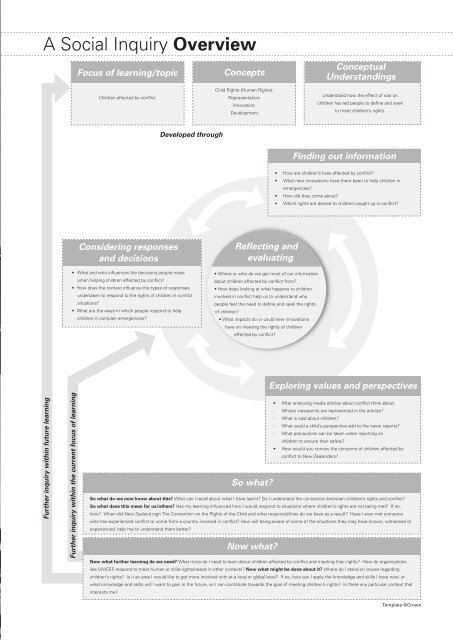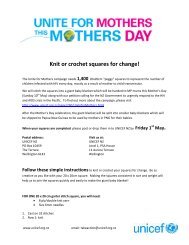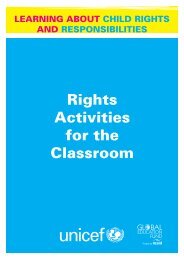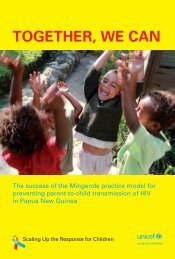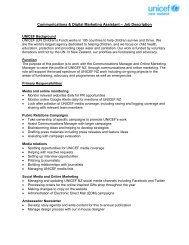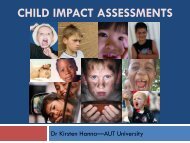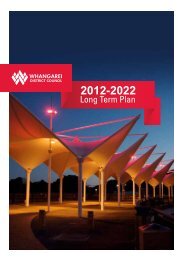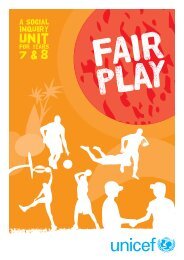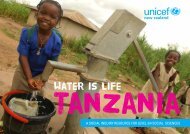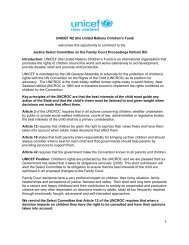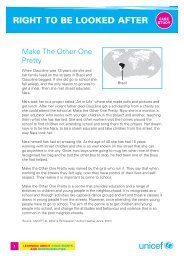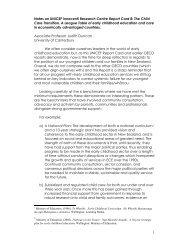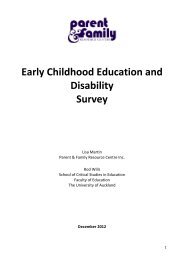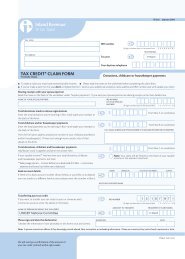Caught in the Crossfire pdf - Unicef
Caught in the Crossfire pdf - Unicef
Caught in the Crossfire pdf - Unicef
You also want an ePaper? Increase the reach of your titles
YUMPU automatically turns print PDFs into web optimized ePapers that Google loves.
A Social Inquiry Overview<br />
Focus of learn<strong>in</strong>g/topic<br />
Children affected by conflict.<br />
Concepts<br />
Child Rights (Human Rights);<br />
Representation;<br />
Innovation;<br />
Development<br />
Conceptual<br />
Understand<strong>in</strong>gs<br />
Understand how <strong>the</strong> effect of war on<br />
children has led people to def<strong>in</strong>e and seek<br />
to meet children’s rights.<br />
Developed through<br />
F<strong>in</strong>d<strong>in</strong>g out <strong>in</strong>formation<br />
• How are children’s lives affected by conflict?<br />
• What new <strong>in</strong>novations have <strong>the</strong>re been to help children <strong>in</strong><br />
emergencies?<br />
• How did <strong>the</strong>y come about?<br />
• Which rights are denied to children caught up <strong>in</strong> conflict?<br />
Consider<strong>in</strong>g responses<br />
and decisions<br />
• What and who <strong>in</strong>fluences <strong>the</strong> decisions people make<br />
when help<strong>in</strong>g children affected by conflict?<br />
• How does <strong>the</strong> context <strong>in</strong>fluence <strong>the</strong> types of responses<br />
undertaken to respond to <strong>the</strong> rights of children <strong>in</strong> conflict<br />
situations?<br />
• What are <strong>the</strong> ways <strong>in</strong> which people respond to help<br />
children <strong>in</strong> complex emergencies?<br />
Reflect<strong>in</strong>g and<br />
evaluat<strong>in</strong>g<br />
• Where or who do we get most of our <strong>in</strong>formation<br />
about children affected by conflict from?<br />
• How does look<strong>in</strong>g at what happens to children<br />
<strong>in</strong>volved <strong>in</strong> conflict help us to understand why<br />
people feel <strong>the</strong> need to def<strong>in</strong>e and seek <strong>the</strong> rights<br />
of children?<br />
• What impacts do or could new <strong>in</strong>novations<br />
have on meet<strong>in</strong>g <strong>the</strong> rights of children<br />
effected by conflict?<br />
Fur<strong>the</strong>r <strong>in</strong>quiry with<strong>in</strong> future learn<strong>in</strong>g<br />
Fur<strong>the</strong>r <strong>in</strong>quiry with<strong>in</strong> <strong>the</strong> current focus of learn<strong>in</strong>g<br />
So what?<br />
Explor<strong>in</strong>g values and perspectives<br />
• After analys<strong>in</strong>g media articles about conflict th<strong>in</strong>k about:<br />
- Whose viewpo<strong>in</strong>ts are represented <strong>in</strong> <strong>the</strong> articles?<br />
- What is said about children?<br />
- What could a child’s perspective add to <strong>the</strong> news reports?<br />
- What precautions can be taken when report<strong>in</strong>g on<br />
children to ensure <strong>the</strong>ir safety?<br />
• How would you convey <strong>the</strong> concerns of children affected by<br />
conflict to New Zealanders?<br />
So what do we now know about this? What can I recall about what I have learnt? Do I understand <strong>the</strong> connection between children’s rights and conflict?<br />
So what does this mean for us/o<strong>the</strong>rs? Has my learn<strong>in</strong>g <strong>in</strong>fluenced how I would respond to situations where children’s rights are not be<strong>in</strong>g met? If so,<br />
how? When did New Zealand sign The Convention on <strong>the</strong> Rights of <strong>the</strong> Child and what responsibilities do we have as a result? Have I ever met someone<br />
who has experienced conflict or come from a country <strong>in</strong>volved <strong>in</strong> conflict? How will be<strong>in</strong>g aware of some of <strong>the</strong> situations <strong>the</strong>y may have known, witnessed or<br />
experienced, help me to understand <strong>the</strong>m better?<br />
Now what?<br />
Now what fur<strong>the</strong>r learn<strong>in</strong>g do we need? What more do I need to learn about children affected by conflict and meet<strong>in</strong>g <strong>the</strong>ir rights? How do organisations<br />
like UNICEF respond to meet human or child rights/needs <strong>in</strong> o<strong>the</strong>r contexts? Now what might be done about it? Where do I stand on issues regard<strong>in</strong>g<br />
children’s rights? Is it an area I would like to get more <strong>in</strong>volved with at a local or global level? If so, how can I apply <strong>the</strong> knowledge and skills I have now, or<br />
what knowledge and skills will I want to ga<strong>in</strong> <strong>in</strong> <strong>the</strong> future, so I can contribute towards <strong>the</strong> goal of meet<strong>in</strong>g children’s rights? Is <strong>the</strong>re any particular context that<br />
<strong>in</strong>terests me?<br />
Template ©Crown


